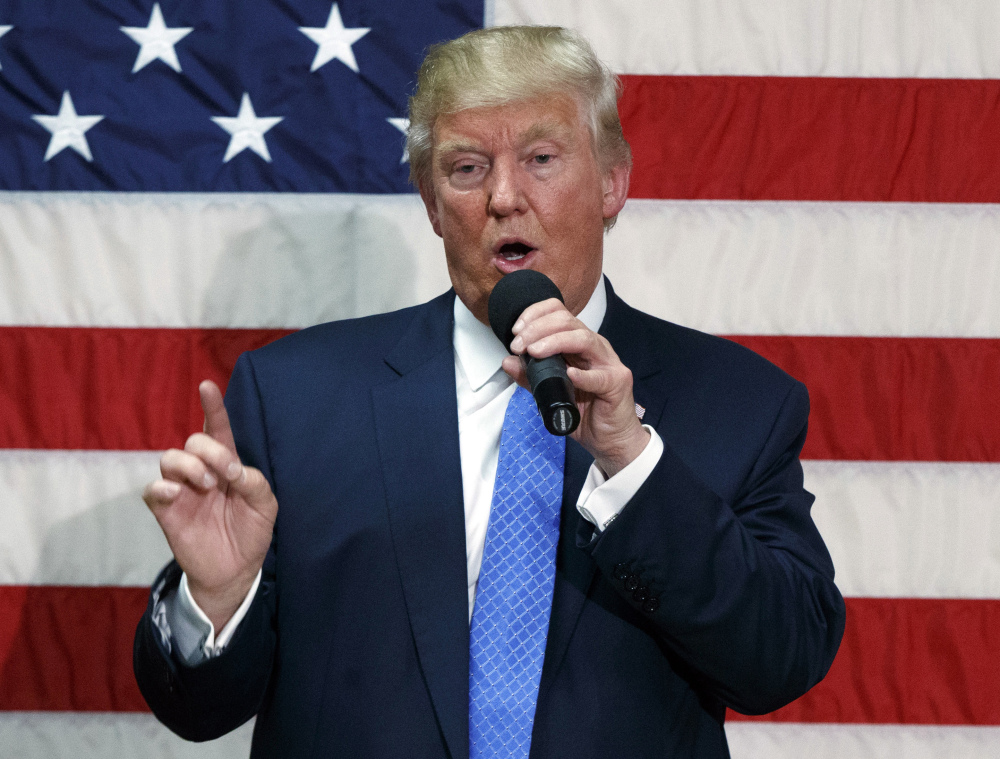The Washington Post
A President Trump could alter the face of this country and its role in the world, in many cases with Congress and the courts having little power to check him. In a series of editorials over the past several days, we have described the vast reach of executive power in areas where Donald Trump has made his intentions clear. He could, in fact, unilaterally order mass deportations, resume torturing detainees, undo the preservation of natural treasures and tear up long-standing trade agreements.
But we should be clear: The scope of the damage a President Trump could do cannot be fully predicted or imagined. His candidacy forces us to confront the extent to which democracy depends on leaders adhering to a set of norms and traditions – civic virtues, to be old-fashioned about it.
Trump has made clear his contempt for those virtues, norms and traditions: He despises the press, threatens his enemies, bullies the judiciary, disparages entire religions and nations, makes no distinction between his personal interest and the public good, hides information that should be revealed and routinely trades in falsehoods. Handed the immense powers of the presidency, what could such a man do?
The honest answer: No one can be sure.
In one of the more thoughtful examinations of the danger, the Brookings Institution’s Benjamin Wittes explained why checks and balances cannot be counted on to protect the nation from an elected leader with contempt for democracy. “Ultimately, the entire executive branch is corruptible by one person because constitutionally, the executive branch is one person,” Wittes wrote on the Lawfare blog. “Everyone else is just his arms, hands, and fingers. That means that over time, the executive branch under Donald Trump becomes Donald Trump.”
Given Trump’s quickness to take offense and lack of impulse control, it is natural to focus on the most extreme possibilities; the president, after all, has authority to order everything from drone strikes to changes in U.S. surveillance policy to nuclear attack. A National Security Council staff that has mushroomed under President Obama is not confirmed by or in any meaningful sense accountable to Congress.
But more prosaic powers also present grave dangers. U.S. prosecutors have enormous discretion to investigate, or not investigate, and Trump would appoint his attorney general and a raft of new U.S. attorneys. These have to be confirmed by the Senate; but if you take comfort in that, simply imagine a Gov. Chris “Bridgegate” Christie at the Justice Department, or a Newt Gingrich – who, in Trump’s thrall, has advocated expelling any American who believes in sharia law – as homeland security secretary.
We don’t have to imagine how Trump would like to wield his powers once congenial officials were in place. He has repeatedly disparaged journalists as “moron,” “disgusting” and “absolute scum” while banning news organizations that offend him from his events and proposing to “open up” libel laws to sue journalists who write “negative” things about him. When he learned during primary season that a wealthy Chicago family was contributing to his opponent, he tweeted, “They better be careful, they have a lot to hide!” While many people remember Trump’s disparaging the Mexican heritage of the federal judge overseeing a Trump University fraud case, how many recall the implicit threat against him? “I’ll be seeing you in November,” Trump said.
If Trump wanted to wield the Internal Revenue Service against that Chicago family; if he tried to use U.S. diplomats to help his hotel business in Russia or Azerbaijan; if he barred disfavored reporters from the White House; if he ignored a judge who told him, say, that immigrants had to be given hearings before being deported – what recourse would Americans have?
Yes, Congress has the power to remove a president who ignores the law. But given the easy Republican capitulation to such an obviously unfit candidate, how far would Trump have to go for a likely Republican House to impeach him? How much damage would he have to do?
We have faith, ultimately, in the integrity of the federal workforce, the resilience of the U.S. system and the essential fairness of the American people. But all three could be tested as never before by a Trump presidency. The nation should not subject itself to such a risk.
Copy the Story LinkSend questions/comments to the editors.



Success. Please wait for the page to reload. If the page does not reload within 5 seconds, please refresh the page.
Enter your email and password to access comments.
Hi, to comment on stories you must . This profile is in addition to your subscription and website login.
Already have a commenting profile? .
Invalid username/password.
Please check your email to confirm and complete your registration.
Only subscribers are eligible to post comments. Please subscribe or login first for digital access. Here’s why.
Use the form below to reset your password. When you've submitted your account email, we will send an email with a reset code.